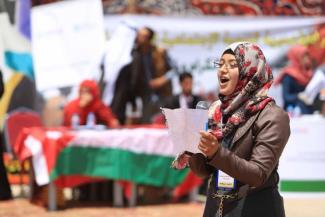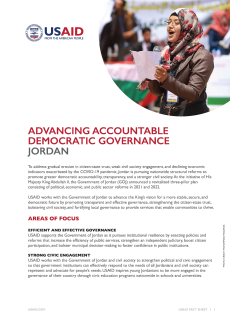BACKGROUND
Jordan is pursuing greater democratic accountability, transparency, and a stronger civil society. In 2011, His Majesty King Abdullah II launched a political reform process that emphasized greater citizen participation in decision-making and increased transparency and accountability at all levels of government. While Jordan has made important progress, challenges persist. Citizen-state trust has eroded amid increases in poverty and the cost of living. Citizen participation in decision-making is limited, particularly among marginalized segments of the population, such as women, youth, and persons with disabilities, and civil society is weak. Many citizens perceive that the government does not sufficiently address their needs.
USAID works with the Government of Jordan to advance the King’s vision for a more stable, secure, and democratic future by strengthening the partnership between government and citizens, bolstering civil society, and fortifying local governance to provide services that enable communities to thrive.
AREAS OF FOCUS
Efficient and Effective Governance
USAID supports the Government of Jordan as it pursues institutional resilience by enacting policies and reforms that increase the efficiency of public services, strengthen an independent judiciary, boost citizen participation, and bolster municipal decision-making to foster public confidence in the government.
Strong Civic Engagement
USAID works with the Government of Jordan and civil society to strengthen political and civic engagement so that government institutions can effectively respond to the needs of all Jordanians and civil society can represent and advocate for people’s needs. USAID inspires young Jordanians to be more engaged in the governance of their country through civic engagement programs nationwide in schools and universities.
Advancing Citizen Rights
USAID partners with the Jordanian government and civil society to advance policies and reforms that protect the rights and interests of the entire Jordanian population, including marginalized groups, while expanding access to essential services. At the same time, USAID equips marginalized groups with skills and resources to advocate for their rights and actively participate in their country’s development.
NOTEWORTHY ACHIEVEMENTS:
- USAID helped host the first ever electoral candidate debates, which reached more than 2 million people on social media. Virtual town halls encouraged local officials to engage directly with citizens and incorporate feedback from more than 12,000 citizens into decision-making.
- In 2022, USAID supported the Institute of Public Administration’s Women’s Leadership Program, which is training 60 women civil servants to become leaders in the public sector. Also in 2022, USAID helped launch the Women’s Political Participation School, led by the Inter-Ministerial Committee for Women’s Empowerment, which is training 120 aspiring women political leaders.
- The Independent Election Commission administered a transparent voting process for the 2020 parliamentary elections with USAID support, mobilizing more than 12,000 youth volunteers and election observers. With USAID assistance, the Commission provided accommodations to ensure equal access to polling stations for persons with disabilities.
- In 2021, the Ministry of Justice established a Government Services Center in Zarqa with USAID support, consolidating 18 public institutions in one location. A similar center was opened in Amman in 2020. The centers streamline services for citizens and expedite case processing.
- USAID helped municipalities respond to citizen needs by mapping street names and numbering in 99 municipalities and installing them in nine, developing needs lists for all 100 municipalities, and drafting local development plans in 72 municipalities.
- Since 2012, 90,000 grade school and university students have participated in civic education training supported by USAID, engaging directly with their elected officials and developing decision-making and advocacy skills.

Mohammad Maghayda for USAID

